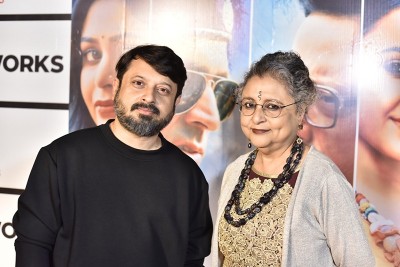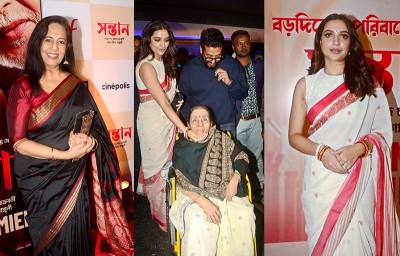
New York, Feb 24 (IBNS): Gender equality, the marginalization of indigenous languages, migration, the refugee crisis, the lives of domestic workers, poverty… All these issues which are at the heart of the United Nations’ work, are also front and centre in some of the films celebrated this year at the Academy Awards.
Two women, Yalitza Aparicio and Nadine Labaki, could make history this Sunday during the 91st Oscar ceremony taking place this Sunday in Los Angeles, in the United States. Mexican actress Yalitza Aparicio could become the first indigenous woman to win the prestigious golden statuette for her role in the feature Roma, by director Alfonso Cuarón. As for Nadine Labaki, from Lebanon, she could become the first Arab filmmaker to be awarded an Oscar, for her film Capernaum.
Their nominations came two years after a heated debate over the lack of diversity in the Academy Awards’ lists of nominees and winners.
This year, the Academy has also shown greater range in its thematic coverage by nominating films that highlight major international issues, in particular related to human rights. For example, the film Roma highlights the need to protect indigenous languages such as Mixtec, as well as the life of domestic workers, and societal inequalities. As for Capernaum, it puts the spotlight on the suffering of migrant and refugee children. Green Book and BlacKkKlansman, also nominated, highlight issues of racism in the United States in the 1960s and 1970s.
This human-rights focus in the world of cinema takes place as the world just celebrated the 70th anniversary of the Universal Declaration of Human Rights.
Focus on indigenous issues and economic inequalities
Director Alfonso Cuarón has hailed Yalitza Aparicio’s nomination in the Best Actress category as the most relevant nomination of the 10 his film Roma secured.
The young woman, who made her acting debut in this feature, plays Cleo, a domestic worker who is Mixteca, an indigenous community in Mexico, specifically in the states of Guerrero, Oaxaca and Puebla. Cleo works for a middle class family in the early 1970s in the neighborhood of Roma, in Mexico City.
In an interview with UN News, Mr. Cuarón noted that, in his country, indigenous peoples are particularly affected by social inequalities. “It isn’t difficult to notice that economic power is closely linked to the color of one’s skin, and indigenous peoples are those who usually end up having the least amount of privilege.”
The director stressed that the film had started a conversation on the racism that persists in Mexico, which he said “has been ignored for too long”. He added this racism had “not just been ignored” but that its very existence had actually been “denied.” He also noted that the topic of domestic work and the rights of indigenous peoples have been overall taboo.
Regarding indigenous languages, of which 2019 is the International Year, Mr. Cuarón lamented that they are “very repressed.” Cleo and her friend and fellow domestic worker Adela only speak it when they are alone “in their own spaces” – i.e. the kitchen or their bedroom – or with the “girl who is belittled, ignored and unappreciated by the masculine part of the family.”
Labaki's 'duty'
In Capernaum, director Nadine Labaki, nominated in the Best Foreign Language Film category, sheds a light on the plight of refugee children, their violated rights, and how extreme poverty affects them.
The movie tells the story of 12-year-old Zain, a Syrian refugee who, caught in the limbo of conflict and forced displacement, files a lawsuit against his parents for having been born.
In an interview with UN News, Labaki said that she had “a duty” – “not even a choice” – to record the reality of the refugee crisis playing out on the streets of her native Lebanon. The small country, which is also facing its own political and economic challenges, currently hosts close to 1 million refugees from war-torn Syria.
“I’m actually surprised when people ask me [what pushed me to make this film] because I think, you know, if I can do something about it, and I can use my voice to do something about it, it would be a crime not to do so,” she said. “So I decided to use my tool, which is filmmaking, to tell that story, to put that story out there and to talk about this struggle because it’s my responsibility.”
Stressing that the refugee problem is visibly growing – as one can see in Lebanon “children working on the streets, carrying very heavy loads and doing very difficult jobs” – Labaki said she purposely chose to tell this story through a child’s perspective. A child “sees things so much more clearly than any adult because he is not informed or altered by societies’ codes or hypocrisy or politics.”
Referring to Alan Kurdi, the drowned Syrian toddler found washed ashore on a Turkish beach in September 2015, she said when she saw his picture, she wondered: “if this child could talk, what would he say? What would he tell the world? How would he address the adults that put him in this situation?”
The different characters in the film are not played by professional actors, but by migrants and refugees who themselves faced very similar situations to those shown in the movie. The main character, Zain, is himself played by a refugee who fled Syria eight years ago.
Labaki explained he faced “very difficult circumstances” and “never went to school.” The only difference with the film, she explained, is that the real Zain has “loving parents.”
Since the film was made, Zain was resettled in Norway where he lives now, through the efforts of the UN refugee agency (UNHCR).
Image Credit: UNHCR/Tom Pilston
Support Our Journalism
We cannot do without you.. your contribution supports unbiased journalism
IBNS is not driven by any ism- not wokeism, not racism, not skewed secularism, not hyper right-wing or left liberal ideals, nor by any hardline religious beliefs or hyper nationalism. We want to serve you good old objective news, as they are. We do not judge or preach. We let people decide for themselves. We only try to present factual and well-sourced news.







